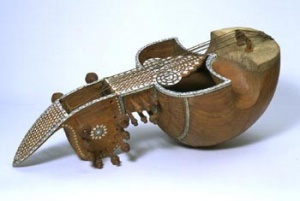Saranda: Difference between revisions
From SikhiWiki
Jump to navigationJump to search
Allenwalla (talk | contribs) mNo edit summary |
Harj-Singh (talk | contribs) No edit summary |
||
| (2 intermediate revisions by the same user not shown) | |||
| Line 1: | Line 1: | ||
[[Image:Sarinda.jpg|thumb|right|300px|SARINDA]] | [[Image:Sarinda.jpg|thumb|right|300px|SARINDA]] | ||
The '''saranda''' is a stringed Indian folk musical instrument which is similar to lutes or fiddles. It has three strings which are played with with a bow while sitting on the ground in aa upright position. | The '''saranda''' is a stringed Indian folk musical instrument which is similar to lutes or fiddles. It has three strings which are played with with a bow while sitting on the ground in aa upright position. The saranda was designed and created by [[Guru Arjan Dev]]. It has a very deep and mysterious sound. | ||
The tribes of India, e.g. Tripuris, use the sarinda in their traditional music and dance. It is often the sole accompanyment for a solo or group of folk singer(s). | The tribes of India, e.g. Tripuris, use the sarinda in their traditional music and dance. It is often the sole accompanyment for a solo or group of folk singer(s). | ||
One of the most famous modern saranda player is professor Surinder Singh, head of the Raj Academy. | |||
{{kirtan}} | {{kirtan}} | ||
Latest revision as of 04:15, 29 March 2009
The saranda is a stringed Indian folk musical instrument which is similar to lutes or fiddles. It has three strings which are played with with a bow while sitting on the ground in aa upright position. The saranda was designed and created by Guru Arjan Dev. It has a very deep and mysterious sound.
The tribes of India, e.g. Tripuris, use the sarinda in their traditional music and dance. It is often the sole accompanyment for a solo or group of folk singer(s).
One of the most famous modern saranda player is professor Surinder Singh, head of the Raj Academy.
| Kirtan: | Raga · Taal · Ragmala · Classical Music · Sangeet · Dhuni · Divan · Asa di Var · Jatha · Simran · Shabad · Tuk · Rababi · Dhadhi |
| Ragas: | Asa · Bairari · Basant · Bhairon · Bihagara · Bilaval · Devagandhari · Dhanasari · Gauri · Gond · Gujari · Jaijavanti · Jaitsri · Kalian · Kanara · Kedara · Maajh · Malaar · Mali Gaura · Maru · Nat Narain · Prabhati · Ramkali · Sarang · Sri · Sorath · Suhi · Tilang · Todi · Tukhari · Vadahans |
| Ragis: | Harjinder Singh · Maninder Singh · Amolak Singh · Darshan Singh · Balwinder Singh · Harbans Singh · Anoop Singh · Niranjan Singh · Amrik Singh · Avtar Singh · Snatam Kaur ·Kamaljit Kaur · Dileep Kaur · Joginder Singh · SS Maskeen |
| Saaj: | Harmonium · Tabla · · Tanpura · Taus · Rabab · Sarangi · Dilruba · · Saranda · Sarode · Sitar · Santoor · Pakhawaj · Dhadh · Dholak · Dool |

